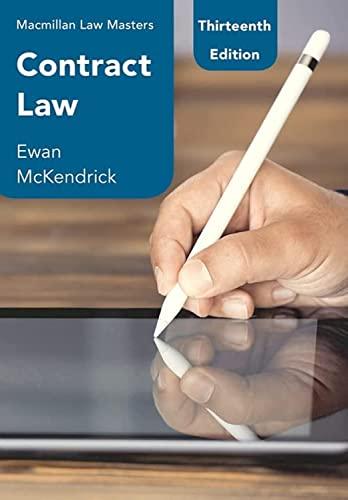Question
IN CLASS ACTIVITY 2 A.Supa-Studios scenario Supa-Studios (SS) is a fashion retail store located in Melbourne, Australia. Christian is a French designer who runs an
IN CLASS ACTIVITY 2
A.Supa-Studios scenario
Supa-Studios (SS) is a fashion retail store located in Melbourne, Australia. Christian is a French designer who runs an atelier in Paris. In December, 2017 SS order items from Christian's autumn/winter collection as follows: 100 silk tops in black for AUD $5000; 50 pairs of grey plaid pants for AUD $7500; and 10 faux-fur jackets for AUD $2000. All items are to be delivered no later than 15 February, 2018 on FOB (Charles de Gaulle, Paris) terms.
The goods arrive in Melbourne on the 15 March, 2018. A representative of SS promptly inspects the delivery and finds that it contains the following: 100 black tops made from a blend that contains 90% silk and 10% polyester; 40 pairs of pants with a black and white houndstooth pattern; 10 faux-fur jackets
In addition to the goods not being as SS expected, since placing the order the Australian media have been reporting on studies from 2014 showing that chemicals used in the manufacturing of faux-fur can be highly detrimental for human health. As a result, the jackets SS was expecting to sell for $500 each are now practically worthless. On the 16 March, SS notifies Christian of the discrepancies in the delivery and that they are returning the goods and terminating the contract.
You may be asked to consider these questions from the perspective of either SS or Christian. In either case, when preparing your own case, you should anticipate and deal with the arguments the other may make.
a)What's the governing law of this contract and does the CISG apply?
b)What are the main complaints of Supa-Studio - what arguments and evidence is there to support any claims SS can make. Do any of SS' complaints amount to a fundamental breach?
c)What remedies are available to SS and which do you think are most appropriate to the circumstances of this dispute?
OR, B. Cathy's Wine Scenario
In September 2015, Cathy Burgundy (a fine wine merchant and the owner of "Melbourne's Finest Wines" in Melbourne) responded to a brochure sent by a French champagne supplier, Jacques de Jacques (JDJ). Although she had not used this supplier before, the price quoted was so good she ordered a large quantity of high quality French champagne. Cathy requested that the champagne be delivered not later than the end of November and agreed to pay for the goods by electronic transfer on proof of delivery.
Cathy made the order in anticipation of the increased demand for high quality champagne from her customers for New Year's Eve (NYE) celebrations on 31 December. The contract of sale was made on CIF (Melbourne) Incoterms 2010. The French supplier shipped the champagne on the 1st December and sent the bill of lading to Cathy.
On receipt of the shipping documents Cathy paid for the goods. The shipment took two weeks to arrive and clear customs. When notified of its arrival Cathy quickly organized its collection. It was such a busy time of year, Cathy did not get around to inspecting the goods closely (ie. opening the boxes) until five days after pick up from the port. On close inspection, she discovered that the bottles were an inferior quality sparkling wine, which, not coming from the Champagne region and not made by the approved 'mthode champenoise', did not bear the exclusive 'appellation contrle' label. The next day Cathy notified JDJ that she has not received what she ordered.
Cathy is very disappointed. She cannot sell this wine to her existing client base and does not have time to organize an alternative delivery of champagne from France to fulfil her NYE orders. Instead, she has to purchase champagne already imported into Australia at a much higher price. Like all wine-merchants, profits made over the New Year season make up a significant part of Cathy's yearly profits.
You may be asked to consider these questions from the perspective of either Cathy or JdJ. In either case, when preparing your own case, you should anticipate and deal with the arguments the other may make
a)What is the governing law of this contract and does the CISG apply?
b)What are the main complaints of Cathy - what arguments and evidence is there to support her claims? Are any of her complaints likely to amount to a fundamental breach of contract?
c)What remedies are available to Cathy and which do you think are most appropriate in the circumstances?
Step by Step Solution
There are 3 Steps involved in it
Step: 1

Get Instant Access to Expert-Tailored Solutions
See step-by-step solutions with expert insights and AI powered tools for academic success
Step: 2

Step: 3

Ace Your Homework with AI
Get the answers you need in no time with our AI-driven, step-by-step assistance
Get Started


